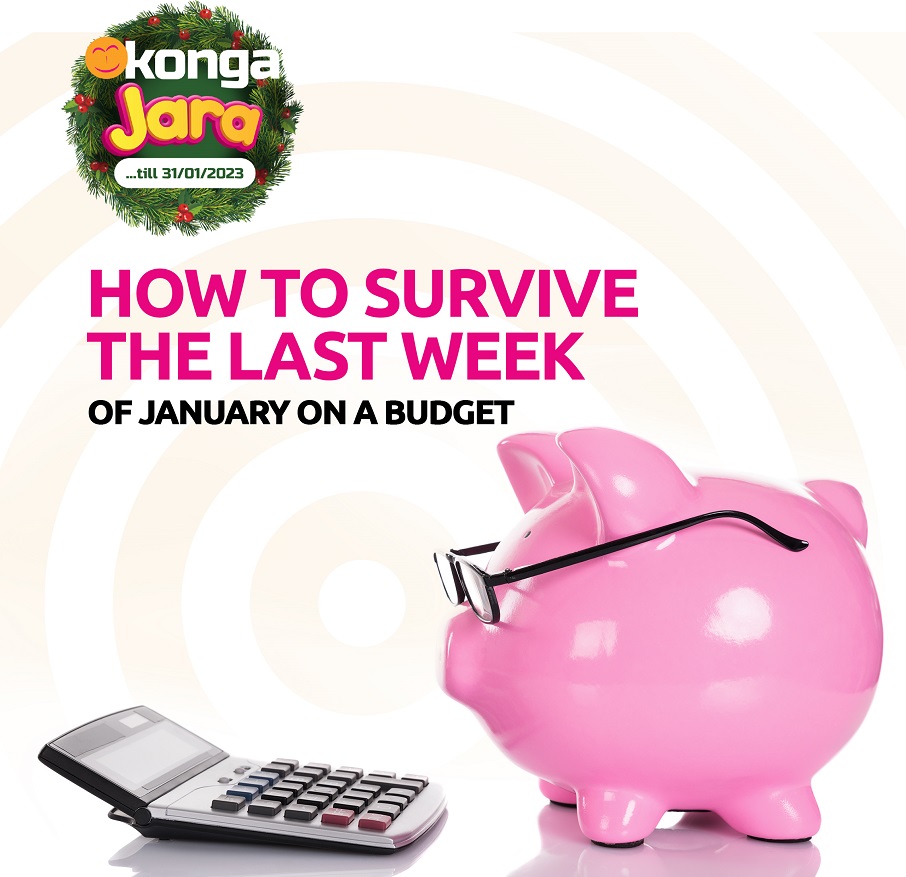Broadcasting
How to Survive the Last Week of January on a Budget

January is renowned for being a month of extremely slow days, mounting bills and a long, grinding wait for pay-day. This is often the case for folks in paid employment.

However, the difficulties that traditionally accompany the month of January impact entrepreneurs or those in business as well. Usually, discretionary or disposable income is often limited and tightly guarded, with many potential customers trying to wade through to the end of the month after the customary lavish spending that trailed the previous year-end festivities.
With the current fuel scarcity plaguing most parts of Nigeria burning deeper holes in the pockets of the average Nigerian, there is a common consensus among many to see the back of January. Beating the sapa occasioned with the January season often requires a certain level of skill and wits. It is better to stroll into February (the month of love) with a meagre balance or even broke than to enter it on your knees with a crushing bundle of debts on your back.
Here are a few ways you can see out the last week of the month in flying colours on a tight budget, courtesy Konga, Nigeria’s leading composite e-commerce company.
1 Make Garri Your Friend
Just kidding, but then you might want to invest a little of your scarce resources on food or foodstuffs that are not so expensive but last for a long time. Food items like Garri, Bread, Beans, and the like, as they allow for varieties, would definitely come in handy if you are the type that cooks their own meals.
2 Substitute
We know our help comes from God, but at times like this, you might like to forego your normal routine and go with more budget-friendly options. Instead of ordering an Uber or a ride to work as you’ll typically do, you may have to wake up earlier and commute via public transport. You can also substitute your expensive beverage for a 3-in-1 coffee or tea; instead of buying that pricey loaf of bread, you could opt for a biscuit instead.
3 Spend more time with friends and family members
The famous saying “The more, the merrier” has never been more beneficial. When things are tight, the best exit route is to be with people who could help lighten the load. With friends, you could share your resources and make the best out of the situation.
4 Be Content
This last week of January, beating sapa entails being content with yourself. In fact, phrases like YOLO or “If I perish, I perish” would do you more harm than good. Avoid frivolities, get only the necessities, understand that all fingers are not equal, and be content with what you have. Mr. James’ brokenness could be your average level, so no matter where you find yourself, cut your coat according to your cloth.
5 Look out for Cheaper deals
Most importantly, a major element to seeing yourself through January smiling is to be alert to juicy offers or the best deals. There is always an advantage to it, that satisfaction that comes from walking away with a sweet deal on a purchase. This is one of the reasons you must embrace Konga when it comes to shopping for all your items this period. In fact, the ongoing Konga Jara promotion remains your best bet. It is an open secret today that most items are cheaper at Konga and you also enjoy the benefit of guaranteed quality and swift delivery.
In summary, if you’re able to stick to the points mentioned above, you’re well on your way to surviving these last 77 days of January, while leaving many of your peers wondering how you managed to pull through in such brilliant fashion.
Broadcasting
Big Brother Naija Season 10 to Premiere July 26 with Record ₦150m Grand Prize

MultiChoice Nigeria, today announced the highly anticipated return of Africa’s biggest reality television show, Big Brother Naija, for its landmark 10th season. Set to premiere over two nights on Saturday, July 26 and Sunday, July 27, 2025, the new season promises 10 weeks of captivating drama, strategic gameplay, and unparalleled entertainment, culminating in the grand finale on Sunday, October 5, 2025.

The audition process for this milestone season was meticulously designed to unearth the most engaging and dynamic personalities from across Nigeria. Audition registrations were held from May 3rd to May 7th, 2025, and saw an overwhelming response, followed by rigorous in-person auditions conducted in Lagos, Abuja, and Enugu from May 16th to May 18th, 2025.
Speaking on the upcoming season, Busola Tejumola, Executive Head, General Entertainment, MultiChoice Group, expressed her excitement: “Today we are not just announcing another season, we are celebrating a legacy.”
While the official theme for Season 10 will be unveiled on the premiere night, viewers can anticipate a fresh wave of excitement. The beloved Ebuka Obi-Uchendu is returning as host, guiding viewers through every twist and turn of the season. This 10th season also has the highest prize at stake – valued at a whopping N150million.
Fans can catch the premier live on July 26 and 27 exclusively on Africa Magic Showcase, Family and Showmax at 7 PM WAT. The Sunday live eviction shows will also air exclusively on these channels. The 24/7 live stream will be available on DStv Channel 198, GOtv Channel 49, and on Showmax.
“BBNaija has become more than just a television show; it is a living, breathing cultural force. It has given voice to a new generation of talent, creatives, entertainers, and the influencer community, and it has refined what homegrown entertainment can achieve when it is done at scale with intention and ambition,” added Tejumola.
With a two-night opening live show for Big Brother Naija Season 10, the season is poised to build upon the legacy of its predecessors, with fans expecting a more dynamic and entertaining experience. Still speaking on what the season holds Dr. Tejumola said “Today we are not just announcing another season, we are celebrating a legacy. From the very first time we introduced Big Brother Naija in 2017, we had an inkling that we had something special. What we couldn’t fully imagine then is how deeply the show would resonate not only in Nigeria but across Africa and in the global diaspora, where our stories continue to connect people to home.”
This milestone season for the iconic show is not without the usual lineup of sponsors. The gold sponsor for the 10th season of the show is Guinness Nigeria. Other sponsors include Smirnoff, Gordons, HFM, Pepsi, Aquafina, Supakomando, Tolaram Group, Bet King, Golden Penny Foods, Haier Thermocool, Checkers custard, and Innoson Motors, among others.
Viewers can catch all the live action and special broadcasts on DStv Channel 198, GOtv Channel 49, and Showmax. The live Sunday eviction shows will air exclusively on Africa Magic Showcase (DStv Channel 151, GOtv Channel 8), Africa Magic Family (DStv Channel 154, GOtv Channel 7) and on Showmax.
DStv and GOtv subscribers can also watch the show on the go using the DStv and GOtv Stream apps available on the Google Play Store and IOS App Store.
Broadcasting
GEFAS to Launch Innovation Hub in Anambra, Backs Soludo’s Digital Vision

Geeks and Founders Alliance for Soludo (GEFAS), a tech-driven network of young professionals, is set to unveil its operational hub in Anambra State as part of efforts to deepen digital engagement and community outreach.

The launch, scheduled for July 17, 2025, will take place at 10 Uche Ekwunife Crescent, Iyiagu Estate, Awka, and is expected to serve as a nerve centre for collaboration, innovation and support for Governor Chukwuma Soludo’s smart city agenda.
Convener of GEFAS, Mr Fred Agbata, said the initiative reflects the group’s commitment to digital progress and grassroots mobilisation.
“This space reinforces our support for Governor Soludo’s vision of a smart, prosperous Anambra. It’s also a demonstration of what young innovators can achieve when united behind a bigger goal—the re-election of Governor Soludo,” he said.
Agbata added that the hub would provide a platform for tech enthusiasts, entrepreneurs and creatives to co-create solutions that address local challenges and promote inclusive development.
GEFAS has called on stakeholders, youth groups and members of the public to attend the launch and engage with the opportunities the space will offer.
Broadcasting
Over 5,600 Pupils to Benefit as ATC, ProFuturo Partner on Tech-Driven Learning

American Tower Corporation (ATC) Nigeria and the ProFuturo Foundation have announced a strategic partnership aimed at transforming the educational sector through digital innovation and technology.

The programme, which is being implemented in conjunction with the Kukah Centre, is expected to benefit over 5,600 school children and 34 teachers across 11 schools in Kano, Kebbi and Taraba states.
The initiative is part of a broader global collaboration between American Tower and ProFuturo Foundation, targeting education gaps in seven African and Latin American countries.
Speaking at the signing ceremony, ATC Nigeria Chief Executive Officer, Mr Pieter Van Der Westhuizen, said the partnership was aligned with the company’s Digital Communities programme, which facilitates technology-driven learning, financial literacy for adults and access to healthcare services in underserved areas.
“At ATC Nigeria, we are proud to support this impactful collaboration, which brings digital tools directly into classrooms. This partnership is not just about equipment—it’s about giving children the future they deserve,” he said.
General Manager of ProFuturo Foundation, Ms Magdalena Brier, described the partnership as a crucial step towards bridging the digital divide and empowering vulnerable communities.
“This alliance reinforces our mission to transform lives by improving access to education and digital tools. Every child and teacher reached through this programme is a testament to what we can achieve together,” she said.
Each school will be equipped with a digital learning kit, which includes computers, tablets, routers, projectors and other essential components tailored to foster interactive learning—even in areas with limited connectivity.
The initiative seeks to strengthen innovative teaching practices and promote inclusive education through digital transformation, with active support from local authorities who were present at the official launch.

 E-Financial2 days ago
E-Financial2 days agoUBA’s LEO Becomes Africa’s First Chatbot to Enable Cross-Border Payments

 News2 days ago
News2 days agoUN Appoints Sa’id, Nigerian to Nuclear Panel

 E-Business2 days ago
E-Business2 days agoNIMC Enrolls 122m for NIN, Cuts Extortion by 40 Percent

 Telecom2 days ago
Telecom2 days agoMTN Urges Nigerian to Regards Telecom Infrastructure as National Assets

 General News2 days ago
General News2 days agoAppeal Court Nullifies Registration of ‘KPMG Professional Services’

 Telecom21 hours ago
Telecom21 hours agoMTN Nigeria Rewards 1,500+ Winners with ₦290m in Mega Billion Promo

 Telecom2 days ago
Telecom2 days agoBitget Launches $6M Global Crypto Trading Contest with New Competitive Segments

 E-Financial2 days ago
E-Financial2 days agoSEC to Introduce USSD Codes to Fight Ponzi Schemes

























